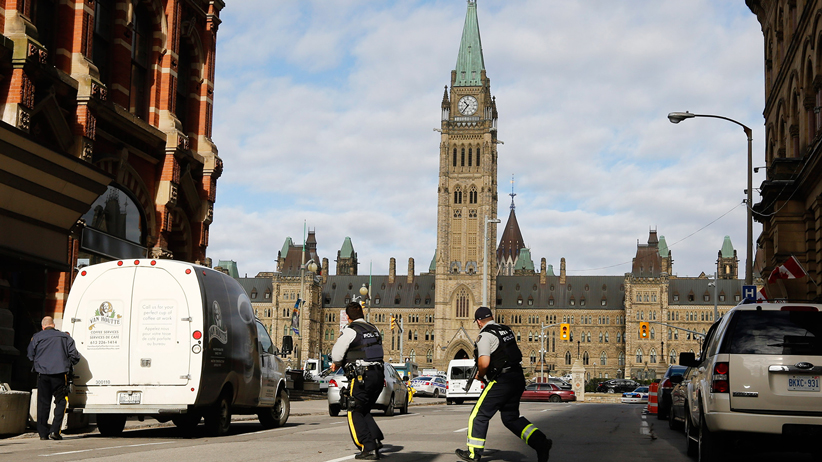The tricky politics of language on Parliament Hill
Just days after the Ottawa shootings, the leaders use ‘terror’ to define the party line
Share

The study of history is a balm for almost everything, including, in today’s instance, the excesses of political rhetoric.
“The major parties, the only ones ever to hold office nationally, do not represent anything in particular,” Blair Fraser, a revered Maclean’s columnist and editor, wrote in 1967. Any distinction between the major parties, he added, “has vanished from all but the vocabulary of political invective. Some Conservatives still call Liberals ‘crypto-republicans,’ some Liberals call Conservatives ‘puppets of Big Business’ or ‘colonialists,’ but nobody takes this kind of talk seriously any more.”
One of Prime Minister Stephen Harper’s contributions to politics is that there are more real differences between his party and others than there were between Lester Pearson’s Liberals and John Diefenbaker’s Progressive Conservatives. But, still today, MPs get hung up on questions of language. An important one arose after Michael Zehaf-Bibeau shot his way into Parliament.
It was very upsetting for everyone who works in and near Parliament, and human nature drew everyone together for a while. That didn’t last. Two days after the attack, Oakville MP Terence Young sent a detailed and compelling account of the attack, as he experienced it from inside the Conservative caucus room, to his constituents. It ended with a description of the party leaders’ statements in the House of Commons when business resumed on the Thursday.
“The two opposition leaders promised solidarity in protecting our freedoms, which was good to hear,” Young wrote. “However, I was very concerned that neither of them could muster the will to say the word ‘terrorist’ or ‘terrorism’ . . . From my experience listening to them for the last two years, neither leader’s world view allows them to believe that terrorism could actually exist in Canada. That explains, in part, their lack of support for our mission in Iraq.”
Anyone tempted to accuse Young of picking nits would soon see he had a point. A week after the attack, the parties gathered again for their Wednesday caucus meetings. NDP Leader Thomas Mulcair took a question on the word “terrorist,” and he stood his linguistic ground.
“They’ve used the word from the get-go,” he said, referring to the Conservatives and terrorism. “It was the word that they used immediately before any of this other information was out there. And frankly, the information that is now available to the public comforts me in my choice not to use the word ‘terrorism’ in describing the act that took place here.
“I think there is a distinction to be used, and when you look at the background of the individual and what was actually going on, that use of that word was not the appropriate one.”
I find a kind of grim hilarity in the fact that Liberal Leader Justin Trudeau, reviewing the same evidence that confirmed Mulcair in his decision to eschew the word “terrorist,” reached the opposite conclusion. “The RCMP said it was terrorism, so it was,” he said. This puts paid to Young’s suspicion that Trudeau, at least, is incapable of imagining terrorism in Canada. An effort of memory might have helped, too: Trudeau’s father invoked the War Measures Act after terrorists kidnapped Quebec’s transport minister and a British diplomat. You could look it up.
As is often the case when politicians concentrate on language, everyone concerned had less success defining a word than in defining themselves.
Trudeau, who would not use the word “terrorism” until an expert told him it was okay, was nodding to the Liberals’ late-breaking fondness for “evidence-based policy.” For those of us who spent the ’90s watching the Jean Chrétien government argue every side of most questions, the notion that Liberalism is synonymous with deference to impartial authority is a bit rich, but let it pass. Self-definition is almost always the most flattering kind.
Harper was confirming, as he seeks to do at every turn, that he alone is tough enough to stand up to the demons haunting Canada. It’s a big part of his self-image. “The real defining moments for the country, and for the world, are those big conflicts where everything’s at stake and where you take a side and show you can contribute to the right side,” he told this magazine in 2011. He named the global fights against fascism and Communism as examples.
Are we in such a conflict now? “I think we always are,” he said. And what’s the conflict now? “Well, I think it’s more difficult to define now,” he said, but “the most obvious is terrorism, Islamic extremist terrorism.” If all you have is a hammer, every problem looks like a nail, and if all you have is global existential struggles, every gunman looks like Stalin.
But I don’t want to let Mulcair off the hook here. The evidence he left behind suggests Zehaf-Bibeau, himself, was quite sure he was a terrorist. To deny him the label because he had a history of mental illness and addiction is to suggest that terrorism is some kind of elevated calling, fit only for thoroughbreds. That’s an odd door for any bouncer to guard.
Mulcair was sending out a signal: If you think the Conservatives are too quick to call people terrorists and too quick to sacrifice all of our freedoms for a witch hunt, the NDP’s your party. Harper was sending a signal: If you think being tougher will make Canada safer, vote Conservative. Trudeau sent mixed signals. Language in Ottawa has served its assorted purposes once again.